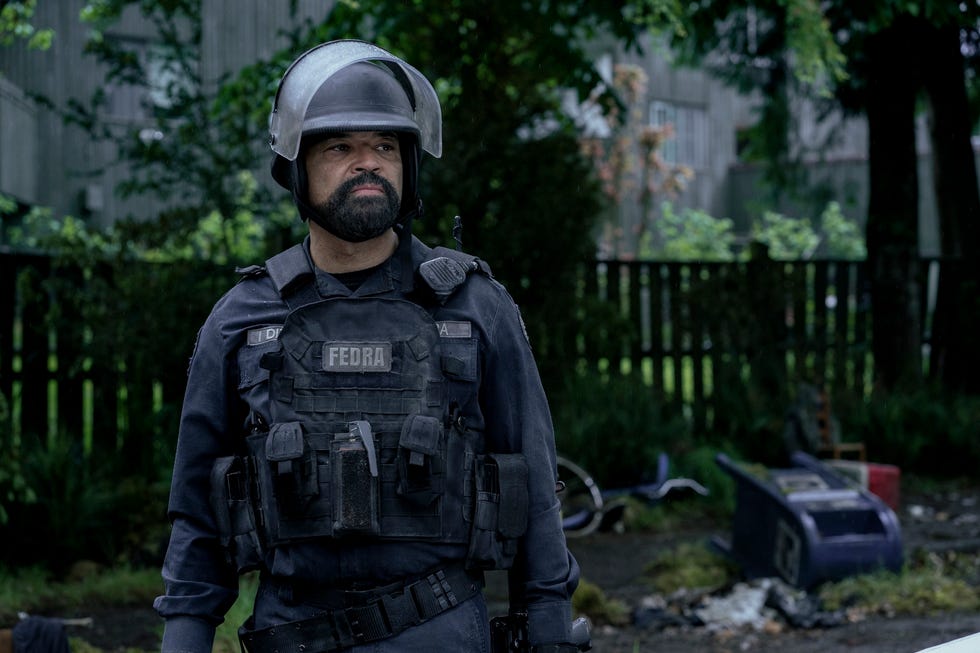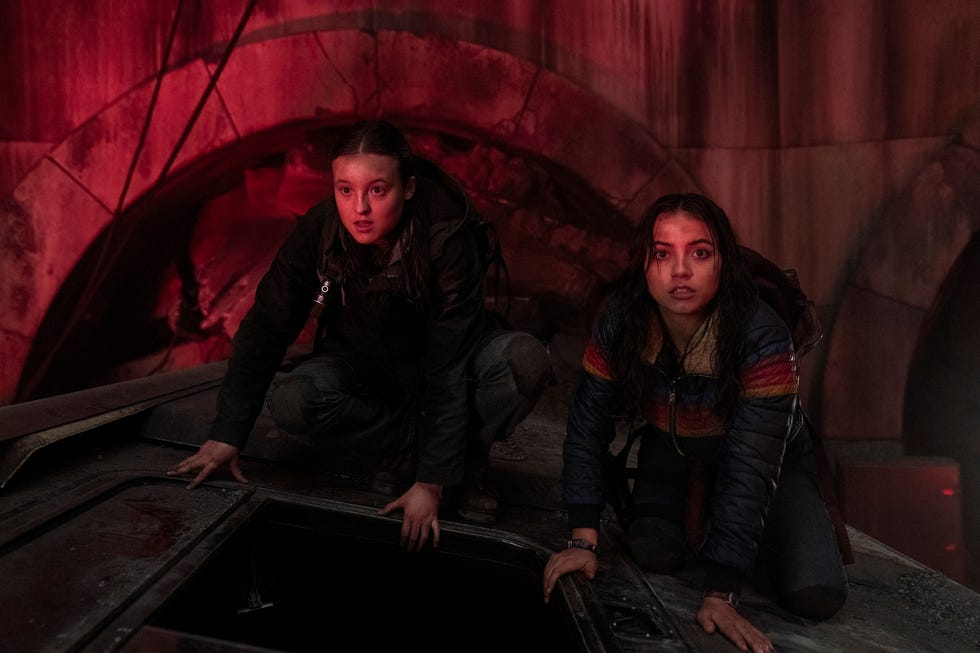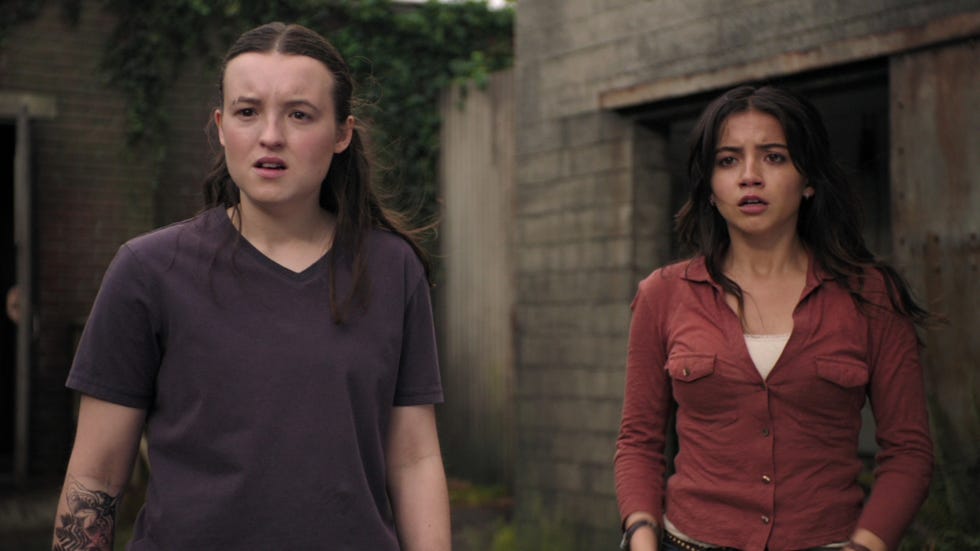<i>The Last of Us</i> Season 2, Episode 4 Recap: Take On Me

Spoilers below.
It doesn’t take any particularly strong display of media literacy to grasp what The Last of Us wants to say about brutality and innocence: The gap between them is a line, not a chasm. And the justification for stepping over that line depends a lot on when, where, and how you started walking.
Take Isaac Dixon, for example. The Last of Us season 2, episode 4 finally introduces us to Jeffrey Wright’s character, a reprisal from his role in The Last of Us: Part II, in a flashback sequence set 11 years before the main events of season 2. We meet him not as the WLF leader Owen first mentioned in the premiere episode, but as a FEDRA sergeant, disillusioned by the callous corruption of his subordinates. Their jokes are chauvinistic and violent, their fascism so forthright as to be deemed normal. When one of these officers asks why FEDRA refers to the local citizens as “voters,” Isaac cuts in: “Because we took away their rights. We took away their right to vote, and somebody started calling them voters to mock them.”
Still, his use of “we” suggests he considers himself one of them, in action as well as title. Or so it seems, until their military convoy comes upon a school bus blocking their path. They infer it belongs to the WLF, and the FEDRA crew readies their weapons. But Isaac stays their hands, and instead climbs out of vehicle alone so he can speak with the WLF’s leadership, a woman he calls “Hanrahan” (Alanna Ubach). He brings along a fresh-faced FEDRA agent named Burton (Ben Ahlers)—the one who asked about “voters”—who aims his gun at Hanrahan’s head. But we quickly get the sense that Isaac and Hanrahan aren’t enemies, a hunch that’s confirmed when Isaac’s next move is to throw a couple grenades into the FEDRA vehicle, killing his officers and signaling his new allegiance to the WLF. Burton, flabbergasted, chooses to join them as well, lest he suffer the fate of his former brothers in arms.

We can’t know what other violence Isaac has committed in the lead-up to this moment. But the resigned, almost exasperated manner in which he slaughters his subordinates suggests he stepped over that brutality-innocence line a long time ago. He has his reasons, and he’s not looking back.
Episode 4 then returns us to the modern timeline, where we watch Ellie and Dina continue to traverse Seattle in pursuit of the Wolves. After enough sniffing around, they notice a television station, its satellite dish painted with massive WLF letters. Ellie wants to storm in guns blazing, but Dina recognizes that, “If you paint a sign big enough to be seen from miles away, that means you want people to know that you’re there. Which also means, more likely than not, you’re prepared. And?”
“They’re on a hill, so they’ll see us coming,” Ellie finishes. (Sometimes I wonder how many hypothetical times Ellie would have died by now if Dina hadn’t joined her on this crusade. Joel really had his hands full keeping this one alive, didn’t he?)
ahThey decide to wait until dark to make their move, and so they wile away a few hours in a record store, where Ramsey and Merced re-create yet another classic scene from The Last of Us: Part II. Ellie scoops up a pristine guitar, maintained for years inside its carrying case, and plays Dina a rendition of A-ha’s “Take On Me.”
I was pleased to see this scene transferred to the HBO show, as it’s technically an optional encounter in the video game. But it’s a beautiful example of the juxtaposition I mentioned above, something The Last of Us: Part II does so well: offering brief moments of peace in a story where the only way out is through, which means you must kill people, and lots of them. Even with Joel’s horrific murder in episode 2 and the loss of numerous Jackson residents, there’s still significantly less death in the HBO series than there is in the game, and both Ellie and Dina’s personalities have been tweaked to allow for more levity, more naiveté, more playfulness. Perhaps for that reason, Ramsey’s “Take on Me” rendition, while lovely, doesn’t hit quite as hard as it did in Part II. Still, it does its job of establishing Dina’s love for her: As Merced sits and watches Ramsey play, her eyes flood with tears. It’s as if she realizes not only the extent of her own feelings for Ellie, but the line they are both pushing up against. Whatever boundaries they cross next, Ellie will not step over them unscathed.
As if to smack us in the face with that point, the very next scene after this touching, heartfelt one is a torture sequence, in which Isaac brutally beats and burns a naked Seraphite hostage for information about their movements. Isaac mocks their steadfast belief in their Prophet, whom he calls “a magic fairy in the sky.” He adds, “Some of you actually understand she was just a person.”
“Heretics,” the Seraphite replies.
They can’t seem to agree who started the apparent turf war between the Wolves and the Seraphites (or “Scars”), who’s killed more children, and who’s more morally corrupt for having killing those children. Even stripped of all dignity and on the verge of death, the Seraphite clings to his faith. “You’re going to lose,” he says. “Every day, one of you Wolves comes to see the truth and takes Her into their heart. Every day, a Wolf leaves you to take the holy mortification to become a Seraphite. And none of us ever leave to become a Wolf.” Isaac can’t seem to argue with that, so he responds by shooting him in the head.
Outside the torture-chamber door, Burton stands on watch. Gone is his wide-eyed innocence from 11 years prior. “Scar got what he deserved,” he tells a fellow WLF officer. “Fucking animal.”
Up until this point, we haven’t been provided much evidence of the Seraphites’s apparent barbarism. Last episode, when they were first introduced, the Scars seemed peaceful and nomadic, fleeing the WLF’s persecution in pursuit of safety. But this week, that impression irrevocably shifts.
At the TV station, Ellie and Dina discover the Seraphites have beaten them to the WLF. They encounter multiple dead Wolves, including several hanging from ropes, their disemboweled intestines spilling out of their stomachs. (As it was in the game, this is a gruesome sight for us as much as it is for Ellie and Dina.) More Wolves storm in to discover their murdered comrades, forcing Ellie and Dina to hide, and then, run for their lives.
The next several scenes are mostly composed of desperate escape sequences. Ellie and Dina end up in Seattle’s underground transit tunnels—yet another familiar sight from Part II—where their safety is short-lived. These tunnels are filled with infected, hordes of which pursue our protagonists through the abandoned train cars and motionless escalators all the way to the entry turnstiles, where Dina gets stuck amongst the rusted bars. Certain her friend is about to become dinner, Ellie thrusts her arm in front of an infected, which tears its teeth through her flesh in Dina’s stead. The sense of terror is well-realized here; even knowing our friends would survive, I was practically watching them through my fingers.

Finally, they take shelter in an abandoned theater, where Dina pulls her gun on Ellie. She’s seen the bite mark on the latter’s arm; she knows there’s no stopping what comes next. “Please don’t make this any harder than it has to be,” she begs. Her tone then becomes angry, even accusatory, as she chokes back sobs. “Why did you do that? Why the fuck did you have to do that?”
Ellie pleads with her to listen. “I would die for you, I would, but that is not what just happened.” She’s forced to reveal her immunity, which Dina—understandably—does not buy. Ellie decides she’ll prove it to her: She’ll bandage her arm, sit down in a chair, and let Dina keep a gun trained on her forehead until the morning. “A lot of times I wish this wasn’t true, but I’m gonna wake up, sadly, as I am right now,” Ellie says. “Me.”
Indeed, the next morning she wakes, and she doesn’t have any fungi growing out of her eyes and ears. She shows Dina her bite wound: clean. Dina, trembling, has her own revelation to share: She’s pregnant.
This won’t be news to fans of Part II, but it’s nevertheless a major dramatic moment, particularly as it leads to Ellie and Dina laying their feelings bare for the first time. In the game, they hook up during a patrol outside of Jackson, moments before Joel’s death. In the show, they crash into one another in the dark of the theater, kissing and tearing at their clothes, eventually having sex on the carpet. When Ellie later asks why “now” was the right time for Dina to admit their mutual attraction, the latter replies, “I thought you were gone. And then, all of a sudden, this future I was imagining wasn’t gonna happen.”

This is another significant departure from the game, in which Ellie learns of Dina’s pregnancy with something like horror. She’s scared for Dina’s well-being, but she’s also angry that Dina’s vulnerable position jeopardizes their mission. “You’re a burden now, aren’t you?” she snaps, instantly regretting the words as soon as they’re out of her mouth. But in the HBO series, Ellie doesn’t even seem particularly surprised by the pregnancy news; she’s too excited at the prospect of becoming a “dad.” The innocence here is charming, if a little puzzling. Shouldn’t she be more afraid? More conflicted? She’s only 19—did she even want to be a parent before this moment? But perhaps it’s the confirmation of Dina’s feelings that pulls the switch in Ellie’s brain. Maybe, for the first time since Joel’s death, she considers that she might get to be happy. Dina, clearly, has wondered the same thing.
Their brief moment of bliss is disturbed by a crackle from the WLF radios, from which they learn that Nora is at a hospital a fair distance from their temporary camp at the theater. Ellie questions whether Dina should come with her, but Dina grasps her hand. Whatever they do next, she insists, they’ll do “together.”
But does Dina really know what she’s promising? Does Ellie? Next episode might bring us their first encounter with one of Abby’s crew. Are they both prepared to leap over that innocence-brutality line, knowing what they now know about each other? And do they understand what it might mean for their relationship? For their family? They’ve both killed before. Now, I suppose, it’s time to see how much more death they can endure—and still remain intact.
elle





